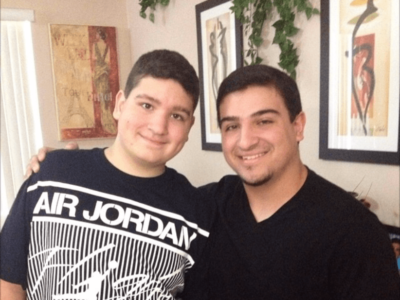On July 6, 2000, I bolted into the hospital room to see the boy lucky enough to call himself “Brandon’s little brother.” He lied in the basinet so peacefully, napping after a clearly strenuous few hours. I’m eternally grateful for that incredible day, however it’s a day where my family became a statistic to many.
Similar to my family, Sante Fe College Freshman Cristina Delgado’s family worried about her young nephew. “We noticed that [my nephew] was a bit behind on things he should’ve already accomplished. He wouldn’t speak, he had a lot of sensory problems, and a few other problems,” Delgado said. “After countless doctor visits and tests, Liam was diagnosed with autism. This never diminished our love for him. If anything, it brought us all closer as a family and our love for him increased.”
The doctors diagnosed my brother Bryan with high functioning autism at 4 years-old. Growing up, teachers set the bar low on Bryan’s educational career. His school traditionally believed that he was unable to focus or formulate answers like his peers. “Unfortunately, there is a stigma about those with autism. People think that they’re intellectually behind and that they can’t have a normal childhood,” said Delgado.
However, many people don’t realize that Bryan can work at the same standard as everyone else. Countless times I quiz him on long division, and he’ll just look down at his fingers and generate the correct answer that took me an entire written paper to solve.
Due to his disability, his vocabulary and articulation have always lagged, but his natural zeal for learning helps him continuously move forward. I called Bryan the other day just to chit-chat, and he started talking about the “abnormalities of the educational system.” What? The abnormalities of the educational system? Bryan has a way of surprising when you least expect it.
In middle school, my brother got picked on by most of his peers. Hearing Bryan’s stories of fending off bullies destroyed me, because I wasn’t there to protect him. Bryan’s body type now resembles that of a linebacker’s, and so the bullying slowed down, but he remained a kid with a giant heart. He holds nothing but love for people, despite what they say about him. His ability to smile even at the bleakest of moments inspires me every day.
When I’m home on break, Bryan and I challenge each other to late night chicken nugget eating contests (we have a tied record of 3-3, I’m going to school him when I get back home for summer), and re-watch episodes of SpongeBob all day long. Bryan doesn’t know it, but he’s taught me more than any professor ever could. You see, Bryan taught me about true happiness.
Every single day someone different picks on Bryan. Every single day Bryan struggles with an unfair workload. However, every day Bryan puts a smile on his face and walks out the door in the morning prepared for whatever will get thrown his way. He always tells me about the good things that happened during the day, but never the bad because the bad seldom occurs to Bryan.
When someone going through hell and back constantly puts on a cheerful countenance, that’s impressive beyond words. I’ve been asked time and time again what it’s like to live with someone with Autism, and every time I tell them the same thing: I wouldn’t want it any other way. If I didn’t have the chance to grow and learn with my brother at my side, my life wouldn’t be the same.
April brings April Fools, the end of semester and the NBA playoffs, but for me the most important event is Autism Awareness. During April, many Autism research advocating groups like Autism Speaks reach out to whoever will listen and help. “I want people to be educated on the matter and realize that these stigmas are the farthest thing from the truth. Those with autism… have so much love and compassion to give, something that is hard to find in the everyday human. This is the month in which we advocate for these angels and educate those around us,” Delgado said.
One in every 68 children is diagnosed with Autism, and there is no known cure. Research for a cure is underway, however only 0.55 percent of total funding from the National Institutes of Health goes to Autism research. In April, Autism Speaks U hold 5K races and seminars nationwide, trying to raise money for autism research.
This month isn’t only important to raise awareness and funding for Autism research, but it’s one of the 12 months where I can exclaim to the world how much I love someone with autism. I don my puzzle piece pin on my shirt every day with pride, so I challenge you to wear your puzzle piece pin. You don’t need to wear the physical pin, but instead reflect the pin with your actions.
I challenge you to educate one person on Autism Awareness at least once a week for every week of the year, so that one day we can really say that it’s OK to be different and we can truly accept one another despite our abilities and disabilities. I love someone with Autism, all I can ask is that you do the same.



















